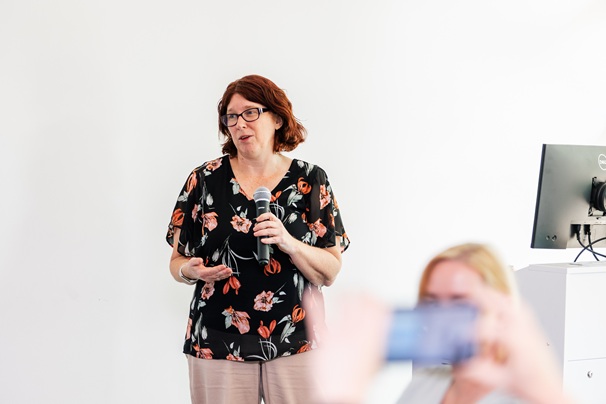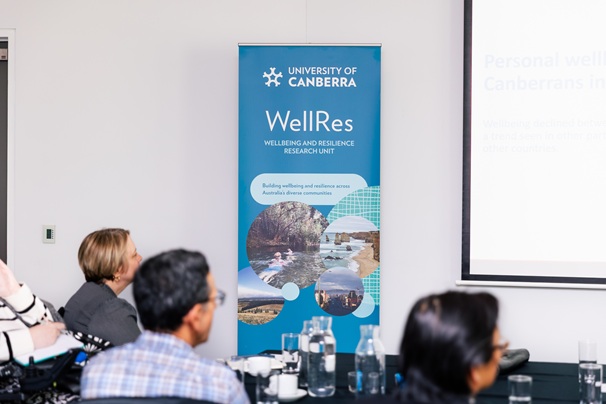Georgie Burgess
8 September 2025: In its sixth year of tracking the way Canberrans feel, the latest Living Well in the ACT Region survey has revealed a drop in wellbeing levels across the Territory, with one in three people reporting low wellbeing by the end of 2024.

Lead Researcher Professor Jacki Schirmer said that despite the dropping levels, ACT residents continue to have higher levels of wellbeing than the rest of the nation.
“We learned that Canberra continues to be an incredibly liveable city with 89 per cent of Canberrans reporting that their local area is really liveable – that is a much higher percentage than the national average,” she said.
The survey asked 3,110 adults living in the ACT region about their wellbeing, resilience, and the liveability of their community.
The cost-of-living crisis was one of the strongest determining factors for wellbeing levels, with 86 per cent of Canberrans reporting that their household expenses grew faster than their incomes.
Over half of respondents have switched their food purchasing habits, as well as cutting down on their heating and cooling usage to save money, and more than a third have delayed medical appointments due to the cost.
Younger and middle-aged residents are most likely to be feeling the strongest impacts.
“In particular the 30- to 49-year-olds are feeling the worst off; they’re the ones who tend to have the larger mortgages, they’ve got kids they’re taking care of, which is keeping them very busy, and we’re seeing amongst that age group that people are becoming increasingly lonely, as well as experiencing financial stress,” Professor Schirmer said.

The report found that nearly 19 per cent of respondents aged 30- to 49-years old, often or always feel lonely – well above the survey average of 12.4 per cent.
The time Canberrans have spent connecting socially has also returned concerning results, with two in five Canberrans cancelling social events in 2024 as a way of managing rising costs.
“People are feeling like they can’t afford mainstream things or even the day-to-day things. So, they’re saying things [in the survey] like ‘I can’t afford to go out to the restaurant with friends because I need to keep that money for other things’, so that higher rate of loneliness we’re seeing is in part driven by those financial stressors .”
In a positive trend, time spent attending community events and volunteering increased between 2023 and 2024, making its way back to the levels that were seen in the first Living Well in the ACT Region survey back in 2019.
“The COVID-19 pandemic really hit community events in Canberra hard, so it’s exciting to see some recovery in that space and getting that increase of numbers back out spending time at events – we’ve also seen an increase in volunteering which had been declining the past couple of years,” Professor Schirmer said.

At the launch Deputy Vice-Chancellor, Professor Michelle Lincoln, reflected on the integral role the University plays in developing crucial research that centres on the lives of those who call Canberra home.
“This long running survey reflects our commitment and support to the region through a systematic tracking of wellbeing in Canberra. If you think about the six years this has taken us from the Black Summer bushfires to the January hailstorms and the COVID-19 pandemic, to the current cost of living challenges that many are facing,” she said.
“What a gift that is to our region to have that information collected over such a long period of time, so we can look at the impact on the lives of ACT residents – as well as the issues that are emerging.”

Executive Branch Manager, Peter Robinson, from the ACT Government’s Wellbeing team said that the work undertaken by the University has put the WellRes team at the centre of expertise when it comes to wellbeing, helping shape life changing policies.
“The survey helps us to better understand what matters most to our community by delivering important information and insights into the wellbeing of those who face persistent barriers to inclusion,” he said.

And despite the downward trends seen in the latest report, Professor Schirmer is staying optimistic that results will turn around – looking back to her own data to remain confident.
“When the COVID-19 pandemic hit we saw a real decrease in our wellbeing in the first lockdown but by the second one we’d figured out how we could actually live well even in a pandemic and wellbeing rates rose again,” Professor Schirmer said.
“So, I think that shows us that we can learn to adapt and change – and that we can again work to support those at risk of low wellbeing and help improve these levels of wellbeing again.”
Find out more about the Living Well in the ACT region survey here.


